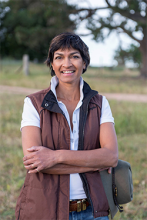Special Representative for Australian Agriculture - Su McCluskey

The Australian Government appointed Ms Su McCluskey as the first Special Representative for Australian Agriculture in late 2021.
Her role is to increase Australia’s presence in international agriculture and food policy discussions, funded as part of the Global Agriculture Leadership Initiative.
The role positions Australia to lift our engagement and influence in international institutions and strengthen relationships with key likeminded partners. This increased effort enhances Australia’s global reputation and leadership on agricultural trade with a view to supporting Australian farmers to access export markets.
Download
Video transcript - Su McCluskey DOCX (61 KB)
If you have difficulty accessing these files, visit web accessibility for assistance.
Australian agriculture interests are impacted significantly by international developments and foreign policy. This includes global policy debates on issues such as agriculture sustainability, climate ambition, animal welfare and pesticide use.
The objectives sought through the appointment of the Special Representative include:
- demonstrating Australia’s renewed commitment to participating in international agricultural bodies and principles and set a strong example to other countries
- demonstrating Australia’s commitment to climate action in agricultural production and food systems
- working closely with domestic peak bodies and representatives, to build Australia’s agricultural sector’s capabilities and engagement with international systems
- promoting Australia’s national agricultural trade interests within international systems, including in regard to non-tariff matters that may arise within the purview of the multilateral trade organisations
- building alliances with like-minded country officials and industry representatives to support particular agendas within multilateral bodies.
Biography
Ms McCluskey brings a depth of knowledge to the role having held many positions in representative bodies for Australia.
Ms McCluskey is a farmer, running a beef cattle farm near Yass, New South Wales.
She is also a Director of LiveCorp, Crawford Fund and the Australasian Pork Research Institute, a member of the CSIRO Food and Agriculture Advisory Group and an Australian Academy of Technological Sciences and Engineering Fellow.
In 2023, Ms McCluskey finished her tenure as a Commissioner for the Australian Centre for International Agricultural Research (ACIAR). She was also previously the CEO of the Regional Australia Institute and the Council of Rural Research and Development Corporations, and the Executive Director of the Office of Best Practice Regulation. She has held senior positions with the Business Council of Australia, the National Farmers’ Federation and the Australian Taxation Office.
